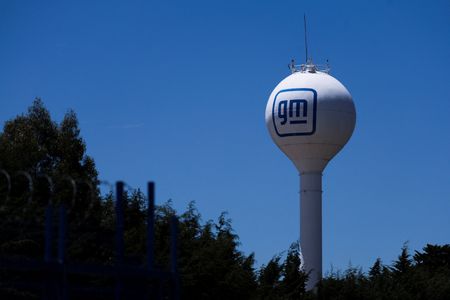By Hyunjoo Jin, Heejin Kim and Nora Eckert
(Reuters) -General Motors and Hyundai Motor on Wednesday outlined plans to develop five vehicles together as they seek to lower costs amid growing competition from nimble Chinese rivals, although some analysts questioned whether the plan would work.
Four of the vehicles — a compact SUV/car/pickup, and a mid-size pickup — are targeted for launch in Central and South America in 2028 and support both internal combustion and hybrid powertrains.
GM and Hyundai did not say where the models would be produced, but said they expected to be rolling out at least 800,000 vehicles a year at full production.
The partnership will help GM and Hyundai battle growing competition from Chinese EV manufacturers in Latin America. But some questioned whether it would create meaningful synergies.
“Even if they sell those new models in South America, it’s hard to beat Chinese competitors which already are leading in the electric-vehicle market with low prices,” said An Hyung-jin, chief investment officer at Seoul-based hedge fund Billionfold Asset Management.
“Hyundai might be able to learn from GM about how to build pickup trucks, but it would take some time to generate earnings,” he added.
The two global automakers will also co-develop and produce an electric commercial van in the United States as early as 2028.
“The partnership itself is a win-win strategy, since GM can learn the hybrid technology from Hyundai while Hyundai can use the relationship with GM as leverage for trade negotiations with the United States,” said Teddi Kim, head of auto research firm Mirae-Mobility Research & Services.
The United States and South Korea last week reached a trade agreement for a 15% tariff on U.S. imports from South Korea, including vehicles.
Shares in Hyundai Motor rose 0.7%, against the wider market’s 0.5% gain. The deal is among several announced between a South Korean company and a U.S. firm in recent weeks, following Samsung Electronics’ chip deal with Tesla and Apple, and LG Energy Solution’s battery deal with Tesla.
Reuters in March reported that Hyundai and GM were nearing a deal to share two commercial electric vans and pickup trucks.
This is the first major partnership for vehicle development for Hyundai Motor.
GM has been unwinding several projects with Japan’s Honda over the past decade. In 2023, the two companies scrapped a $5 billion plan to jointly develop affordable electric vehicles.
Chinese carmakers have released several high-tech, low-cost models, putting pressure on legacy rivals such as GM to slash expenses and streamline manufacturing processes. To compete with these rivals, many have explored partnerships as a way to share development costs, especially for battery-powered models.
Cutting costs is even more pressing as tariffs have added billions of dollars in expenses for automakers around the globe.
(Reporting by Nathan Gomes and Anshuman Tripathy in Bengaluru, Nora Eckert in Detroit and Hyunjoo Jin and Heejin Kim in Seoul; Editing by Tasim Zahid, Stephen Coates and Kate Mayberry)










